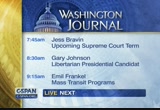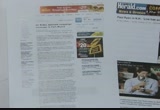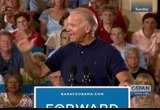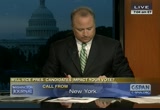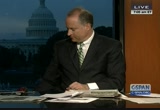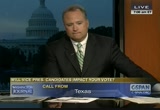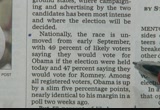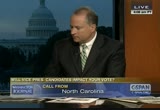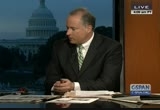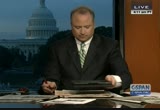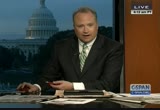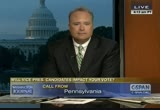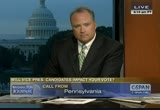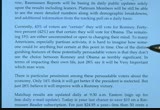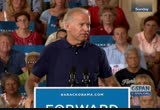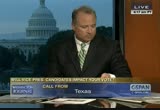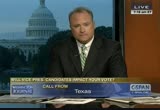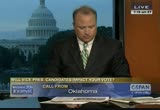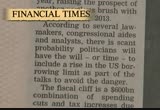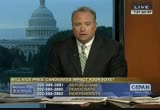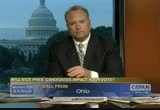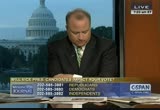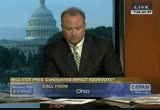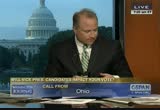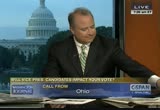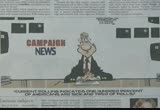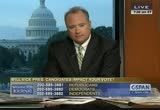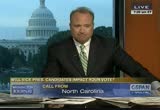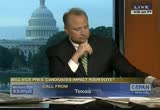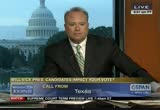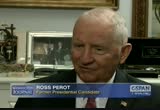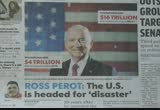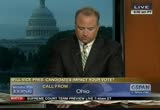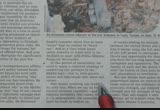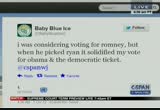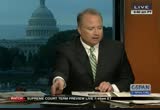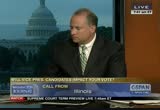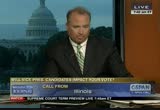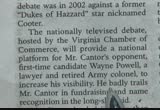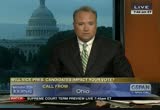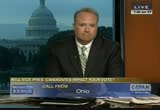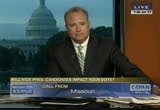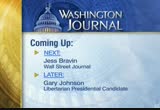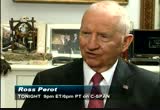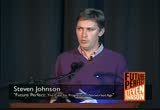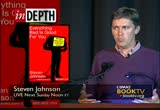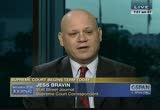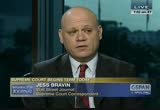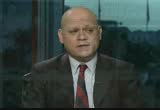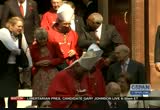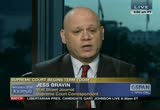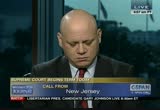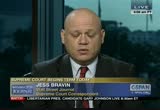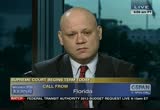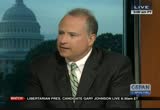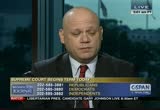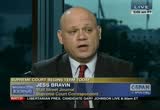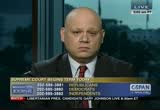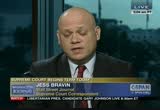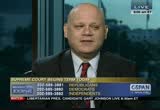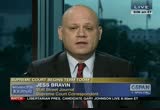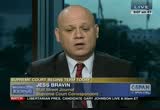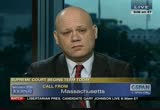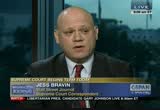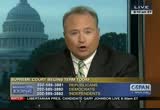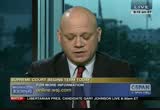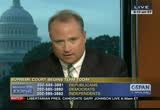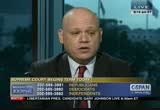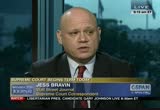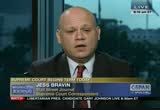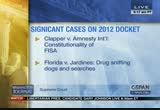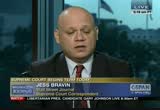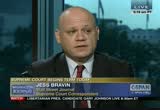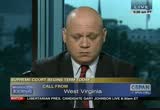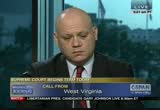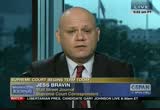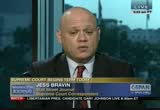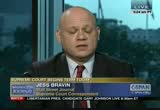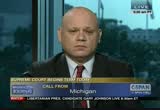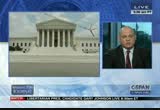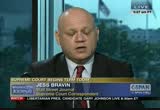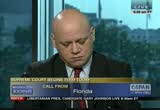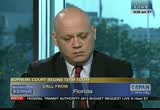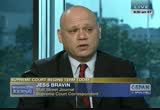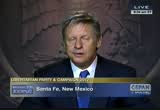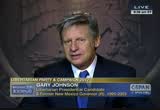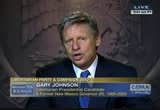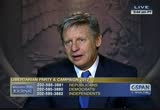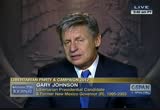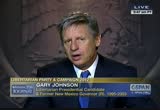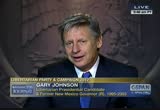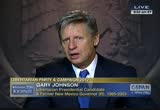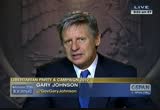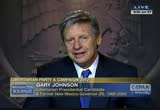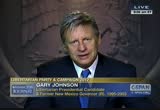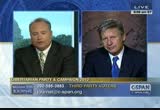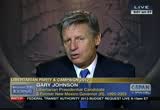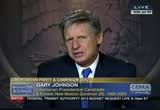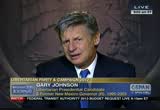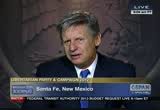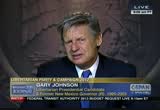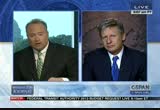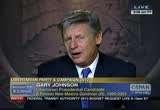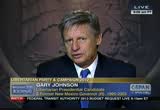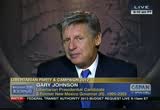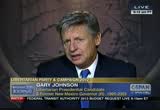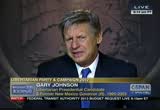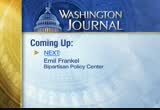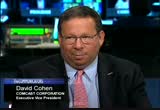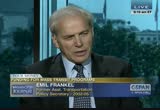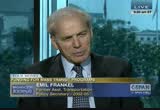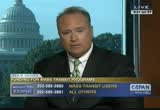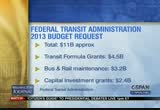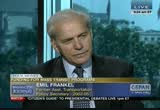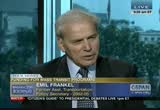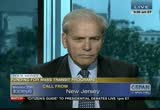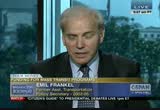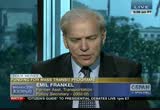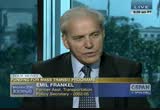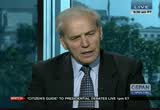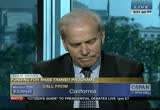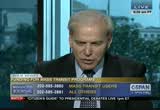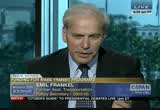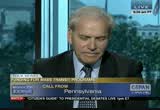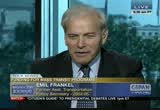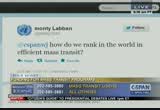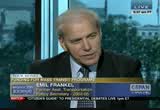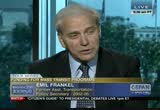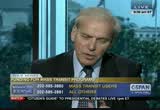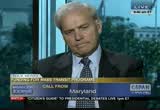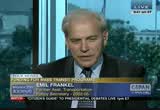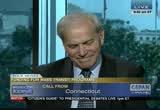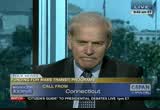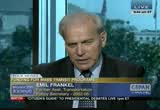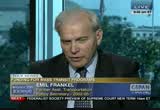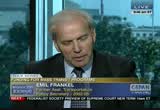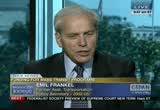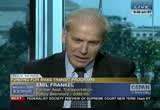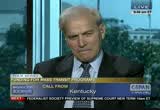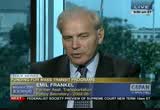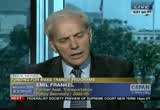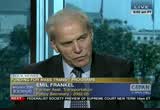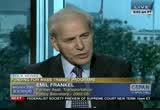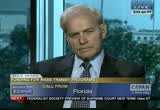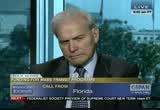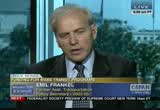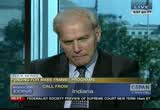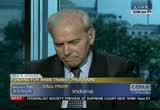tv Washington Journal CSPAN October 1, 2012 7:00am-10:00am EDT
7:00 am
court term. later, former assistant transportation secretary will look at the 2013 budget request for the federal transit authority and how the money is allocated. "washington journal" is next. host: on this monday morning we want to get your take on the vice-presidential nominees jill biden and paul ryan and paul ryan. will they impact your votes in november? here are the numbers to call --
7:01 am
a couple other ways to get involved in the program, twitter and facebook. or you can send an e-mail. we look forward to talking to you. here's the front page of the new york times -- their first debate is wednesday, so they are laying low today. that gives us a chance to check in with you on the vice presidential candidates. here are some of the weekend's events with paul ryan and vice president biden on the weekend from the papers in florida. one headline --
7:02 am
and this story in the boston herald -- that the play on words to the new hampshire state motto. just a sprinkling of the weekend coverage. here's a piece on paul ryan and joseph biden. [video clip] >> they voted against extending the middle class tax cuts. why? because they were holding it hostage to make sure they could continue their tax cuts.
7:03 am
and romney adds another tax cut with a total cost to the economy of $1.70 trillion. it is $250,000 a year in additional tax cuts for those same 120,000 families and anybody making more than $1 million. >> all these promises were made on the idea of hope and change and it sounded pretty good to people. but when the rhetoric went aside and the time to act occurred, the ideas are the old idea that a failed time and again. borrowing and spending and regulating and taxing and printing money, all these things do not lead to prosperity and. all these policies say take power from people, many from families and a successful small businesses and job creators, ascended to washington and then they decide.
7:04 am
that does not work. host: that's a taste of the vice-presidential nominees over the weekend. they will go head-to-head on october 11 in their only official the bait. let's stick to your calls. will the vice-presidential candidates impact your vote? in harvey, louisiana, our first caller. caller: good morning. obama and biden are cutting the military and they don't even say much about it on the news. things will be cut, especially in the navy. there are many people in afghanistan and they will go out with no retirement. as far as romney, i'm not happy with him either. host: our next call is kevin on the line from the democrats. caller: my view on paul ryan is
7:05 am
that his health-care plan, the vouchers, it allows an increase based on inflation. in the last 10 years the cost of health care has gone up 11% per year. so it would be up to the individual voucher holder to pay the difference. this has had a tremendous impact on the votes of older people. recent polls show older people are leaving the republican party because of the direct impact of paul ryan as being chosen as vice president. host: let's hear from john in pennsylvania on the independent line. good morning. will the vice-presidential candidates impact your vote? are you there?
7:06 am
let's try missoni in fort worth, texas. -- tony in fort worth, on the democratic line. caller: yes, i think it will impact the vote, for me in particular. during the primaries, i think mitt romney and saw that a generic candidate would probably beat barack obama. i think that's why he is not elaborate on any of his plans. then he chose paul ryan, who has a very distinguished voting record and he has written policies that are extremely right-wing. so i think that he has put himself between a rock and a
7:07 am
hard place when you are looking at what he thinks and what paul ryan thinks. often conflict over their different views. host: everything happening over the weekend and this week is very busy under the umbrella of lots more polls coming out. here's one in the "washington times" -- the washington post says the race is tight but not in the key states. they point out to that nationally the race is not moved since early september.
7:08 am
carolyn is calling from burlington, north carolina, a republican. will the vice-presidential candidates impact your vote? caller: definitely. i love the fact we would have someone fresh and paul ryan. biden is a gas machine. i was very offended as an african-american for him to say they're going to put you all back in chains. it seems to me that the
7:09 am
democratic party, i used to vote democrat, but they don't really reflect my views not only as an african-american but as a christian in what the dnc did with not wanting to have jerusalem as the capital of israel. i went with mine to the virginia beach rally. so i was in virginia beach and i saw paul ryan. there were so many people. if people are listening to just pull, go out to a rally. you cannot see, there are so many people. paul ryan walks the walk and talk the talk. he also dated a black girl in college, so that's pretty cool. host: thank you.
7:10 am
this on twitter -- thee's a little more from i congressman and chairman of the budget committee. he was on fox news on the weekend talking about the upcoming debate. [video clip] >> he is fast on the cuff. he is a witty guy and has been doing this four years. you're not going to rattle joe biden. he is the sitting vice-president and ran for president twice. what i hope to achieve is to give people an alternative, a very different governing policy and a different philosophy. joe is very good on the attack, and trying to confuse the issues so that the person leaves the debate confused about who stands for what. my job is to make sure they are not confused about what we stand for and what they stand for. >> you have said olsen, a
7:11 am
supreme court appellate lawyer, who won bush versus courgore, as -in. standin >> he is one of the best litigators in americate. he has studied joe biden's tapes and his style. host: he's been preparing for the debate with ted. in kentucky and that is the second of four debates. the first one in denver this wednesday between the president and mitt romney. fort meade is on a line for democrats, john, good morning. caller: good morning. thanks for taking my call. i have been a registered
7:12 am
democrat all my life. my dad was a union electrician growing up in west virginia, the coal mining area. everybody is a democrat there. especially the last four years my opinion, i feel the administration is very weak. when the chinese are coming over here and winning contracts with stimulus money and people getting further in debt. the american dollar is not worth what it used to be. i was not excited about romney at all. once paul ryan got in there, that kind of changed my opinion. i thought we had control of congress and we had a chance with obama for four years. now they can say we can tax you for doing nothing. i will give the other party a try. i will let the republicans have this one and see what they can do in a few years. if they suck, my vote will
7:13 am
change again. host: interesting call. now we are on the line in pennsylvania with pstill phylis. turn down the tv. caller: hi. host: you are an independent. what are you thinking right now? caller: i will not vote for biden. he sounds crazy, always granting. nothing he says makes sense to me. as far as obama, i watch him. when he went overseas and talk about how we need to apologize
7:14 am
for everything we do. and then i heard an interview that he gave with someone when he said that after his mother- in-law had surgery that it would be a good idea if an older person lived on pain pills instead of having their problem taken care of. another thing, and egos around the country and talks, he looks almost like the rabble-rousers' when he goes around the country, it looks almost like a rabble rouser. host: gene is an independent. good morning at. -- jean. caller: i will not vote for paul ryan. i have been watching -- i
7:15 am
watch c-span a lot and the commentaries on the other political channels. he does not ring true to me. i had been watching before he was on the ticket and have been following it for years with john boehner and his congress. i will not vote for anybody of john boehner's crowd. host: ok. a little bit more insight into the polling. a rasmussen poll fromepo the weekend --
7:16 am
is more from the vice-president on the weekends and florida. [video clip] >> they're spending a lot of time telling you what barack obama and joe biden are against and what we have done. the attack everything. the truth of the matter is that nowhere is it more clear what they would do that in medicare. let me start by giving you a few specific examples. to make a examples. number one, they have laid out clearly, they say, that what barack obama and i did was we endangered medicare, that we stole money from medicare and we did this to get obamacare and all this. you see it in ads and everything
7:17 am
they say. nothing could be further from the truth. everyone of you in this room who is on medicare or has a mother or father on medicare knows that since barack obama acted, your parents and those of you on medicare have more benefits than before. host: back to your calls on whether the vice presidential nominees will impact your vote? raymond is a democrat in waco, texas. caller: good morning. i want to make a comment on the medicare issue. i think americans should be very worried about mitt romney and paul ryan one thing to debate on that voucher. i have been to mexico. i am trying to understand what they are trying to do with that voucher. i think people should understand a voucher has a limited.
7:18 am
if that limit of money runs out, especially old people, and young people should be thinking about it, because we are getting older, once that voucher runs out, people will start tasting a little bit of a third world thing. when you go to a doctor like in mexico or any other third world, doctors over there ask you first before they attend to you if you have insurance or money. if you don't have either, they will tell you to go back outside. that is very worrisome. to make another comment about the debt we have, people need to understand that started with republicans throughout the years before obama.
7:19 am
no regulations on wall street. it's very worrisome. i think obama is doing the right thing trying to regulate especially on wall street, because wall street is a funding tunnel of getting money out of this country and not taxing the rich. host: money is in oklahoma, republican. good morning. caller: the man before me was just on the talking points of the democrats. the vice-president does not make a difference to me. but the president does. when this man obama gets in there again, people are going to suffer. hen hea terrible thing wen
7:20 am
wants us to be a third world country and the like all the rest of the countries. we're not like all the rest of the country's. we fought not to be like all the rest of the countries. the polls are skewed. they did not ask me. there are plenty of other people they did not ask either. so there are plenty of people who will vote for romney. he will be surprised when that day comes. host: thanks for calling. lots of financial stories in the papers today.
7:21 am
7:22 am
but i would like to get more on whether the vice presidential candidates will impact your vote. rose is on the line from ohio, a democrat. good morning. caller: there was a documentary yesterday from noon until about 6:00 on current tv. f the last the side o administration. there were talking about the coen brothers -- koch brothers running the whole place. they are in the schools and in the advertising, every facet. they came from russia and got all that money.
7:23 am
the other issue was romney. he donated $4 billion to the mormon church, so he is still in the church. i would like to have everybody here about those two people, about the russians and the mormons and they will make up their mind. host: let's try lesley from ohio, independent. hi. caller: >> thank you for the moment to have this forum. it's a great treasure. we live in a country where a lot of times people don't listen when others are speaking. i think you do a great job moderating. host: banks. i appreciate your call. -- thanks. caller: do i believe the vice president makes a difference?
7:24 am
i think the composite ticket of any party absolutely makes a difference. you are looking at a partnership no different than any other partnerships, whether it be a french ship or a working relationship. -- a friendship. no party is going to represent absolutely 100% of what one voting person is going to absolutely like. no different than when i look at my husband. is the everythinperfect? no. we are a great partnership. there are so many poles, every 10 minutes. -- there are so many polls, every 10 minutes. the trouble is sometimes we
7:25 am
don't read to the last paragraph that starts about what the population sampling was. there was a recent poll in columbus and the dispatcher that about the 61 and the 42. only 15% of all those that were invited to be part of the p oll responded. maybe some people will respond. maybe some would answer the phone. when you look at a poll -- and they changed constantly -- maybe all the way through and look at a sampling. overall, you have to go with your hard and vote what you believe. host: 1 abuse seen on air and in the ads the last couple days? -- what have you seen?
7:26 am
caller: in ohio, they are all over the place. i can almost do my own personal impression of everyone. there's the big race for sure rod brown -- sherrod brown. you'll see them everywhere, positive and negative. the same for the presidential race. those are the predominant ones. the interesting thing, it is amazing. you hear the repetition of those talking points. then you wonder, do people really get any deeper? do they actually investigate or are they merely turning on various channels and. the talking heads? over the weekend i was listening to someone and they said all we are looking for is that sound bite, that one little point.
7:27 am
i am off work right now recovering from a health issue, but i'm doing great. my goal in life is for us to be a working population that contributes to a better society, not having a mud race over who can throw the most bmud. we have businesses coming back to ohio and people going back to work, but the ads are increasingly longer and there are more them. you cannot run away. host: thanks for spending time with us and explain the situation in ohio. there's a new york post cartoon this morning with an anger man delivering campaign news.
7:28 am
appears a clip from governor chris christie of new jersey on one of the morning programs yesterday, talking about the presidential debates this week. [video clip] >> he's had a tough couple weeks. let's be honest. i will not sugarcoat. so here's the great news for republicans. we have a candidate who will do extraordinarily well on wednesday night. the opportunity to be on the same stage with the president and the first time a majority of the people will vote in the race will have an opportunity to make a direct comparison. i've seen mitt romney do this before, he will lay out his vision for america. he will contrast what his view is from the president's record. this whole race will be turned upside down on thursday more and. -- thursday morning. host: doug is a republican in north carolina. caller: i appreciate you taking
7:29 am
my call. if i had been obama i would not have been campaigning. i would've done something for our country. this country will be worse off than ever in the whole world. i don't think we need him no more. he has not beenood from the first day to the last day. i ain't interested in him. i want him out of there because we need mitt romney or someone better. that's all i can say. i mean it from the bottom of my heart, this country is in bad shape. i wish we did have good leadership. i would want to go out with a good name if i was the president. i cannot say what i want to. this country better wake up. i appreciate you taking my call and i love the united states of
7:30 am
america, but we need better leadership. we need good people to pray for god to lead us in the right direction. host: we have plano, texas with brian, a democrat. caller: good morning. as far as the vice-presidential selection, i have been known to vote republican in the past. as soon as they chose paul ryan, i said, there's no way. far too radical. i don't think a lot of people stop and think. their parents are part of this election. if you elect someone into the white house and give them control of congress, to be able to turn medicare into a voucher program, the effect that it's
7:31 am
going to have downrange is horrible. i want to make another point. i am so tired of hearing the president had the congress for the first two years of his term. that is 100% incorrect. people need to educate themselves on how congress works. he had 60 votes until august when tent kennedy died. -- ted kennedy. then he had 59. a special election seat was triggered, the election with scott brown, that gave the republicans 41. then we lost senator byrd. that was another vote that we lost. so the president only had a
7:32 am
senate for about eight months. in that eight months he was dealing with the worst recession since the great depression. so people need to educate themselves and stop going with these party lines of the democrats controlled congress two years and so on. there's only so much you can do. host: thanks for calling. this on twitter -- on facebook --
7:33 am
gary johnson will be on this program to take your calls in about an hour, 8:30 eastern time. the last call from texas reminds us of the interview with ross belprospero. -- with ross perot. richard spoke with him down in plano, texas. the headline, the u.s. is headed for disaster. the full interview with richard wolfe of "usa today" talking with perot, 9:00 p.m. eastern time. [video clip] >> do you think if we had had a administration from 1993 it through 2001, that things would be different today in terms of our fiscal picture?
7:34 am
>> i would make every effort. i would have had to deal with the two parties. i would've gone directly to the american people for their full support. once you actually have that, you probably can get them to agree to anything, including a bad idea, which i would not have done. someone asked someone if he still stood for anything, and he said, "young man, i stand for reelection." host: that was an interview with ross perot. and here's the front page written by richard of to date ---- written by richard wolf today --
7:35 am
ron is calling from cincinnati. independent. will the vice-presidential candidates impact your vote? caller: yes. the president is like the quarterback. then you have a guard. that is his job. all the congress did was filibusters' so the president could not get anything done it. i will talk about the keystone pipeline from canada to texas. if that if ghostin, you will be running oil with sand in it next from canada to texas. there's one in michigan that is leaking. one of them out west has been leaking the last two months or three months and it has oil on
7:36 am
top of the ground. it also affects the production of food and when it rains it floats on top of the water. when the water dissipates, it goes into the ground. thank you. host: here's an e-mail -- doris is on the line from chicago. good morning. caller: the vp pick usually mirrors the views of the presidential candidate. ryan was one of the 15 republicans that met on obama's inauguration night and decided to obstruct the recovery of the country. if people look at history they will see that when we have
7:37 am
republicans in charge for any length of time, we have had financial disasters. we had a parade of republican presidents and then what happened was we had the great depression. enter a democrat and we had recovered. then came ronald reagan and bush and we have the savings and loan scandals. here comes another democrat to save our nation, bill clinton. it only took bush and dick cheney one-term to bring about the recession. now we have another democrat to the rescue. why do we keep having these right-wing people in places of power when all we have our own financial disaster after another? host: by the way, mitt romney writes in the wall street journal and opinion.
7:38 am
two candidates are preparing for the debate on wednesday in denver. at the same time we are asking about the vp candidates and whether they will impact your votes. vermont on the line, independence, mary. will the candidates impact your vote? caller: absolutely. primarily, we need someone who is ready to go if something should happen to the president. by far, biden exceeds paul ryan in those qualifications. he has done a wonderful job as vice president.
7:39 am
truly exceptional in comparison to others. you don't hear about it much, but if you go to alternate media you get a very good idea of how hard this man works and how capable he is. the definitely would be my choice. the other thing i would like to comment on. i am a retired teacher. americans really need to understand the history of our issues, not just what the talking heads. are heads if we truly understand how these issues unfolds, i think people would better appreciate how president obama is and how much he really does get the layers of effort that need to be made in order to return our lives around. host: we have time for a couple more calls. this on twitter --
7:40 am
from afghanistan, just as many papers reported that, about the death toll of the war being at 2000. this is the river front page of the arizona republic -- and three nato soldiers have been killed in an afghan suicide bombing, if you will not yet heard about it. the washington post version of this story is on the camera. it says -- that the latest from afghanistan. peoria, illinois, republican,
7:41 am
obie. caller: i have been a republican all this time, however, i votedve that paul ryan for part b and that put a lot of strain on the economy. if you look at his history over the years, he was irresponsible during the bush time. all of a sudden he's a born- again new guy that knows how to fix everything and is causing -- i voted republican all my life. but when obama came into power they decided to gang up on him before he could write a bill.
7:42 am
they are talking about he has had the senate for two years. every bill this guy tried to pass was filibustered. they did not allow him to govern. what will go on this time, the fair minded republicans will decide that we have not allowed him to govern and they will give him a chance. republicans are going to go out and vote for obama again. i cannot believe i am saying this, but that is what is going to happen. because it's not right.
7:43 am
i lost my job in 2008 when this whole thing crashed and i know why it happened. bill clinton said that obama put a bottom to the fall. my fellow american citizens have amnesia. host: thanks for calling. we want to get another call or so. there's a debate tonight on c- span2. a rare debate for chirping. this last debate was in 2002 against a former dukes of hazzard star. this is on c-span2 tonight, televised nationally.
7:44 am
we will have that debate at 7:00 live on c-span to. we will have a couple other debates live on c-span starting at 7:00 beginning with massachusetts, the senate race, and the nebraska senate race at 8:00 eastern. avon lake, ohio, democratic caller, kathy. caller: good morning. i am a mother of five with his son in iraq. i've been a democrat since i voted for ronald reagan the first time and then trickle-down economics nearly killed our family. i watched clinton fix the budget and change everything and it was great. then i watched it all go bad again. to the vice presidential candidates, i just feel that
7:45 am
biden is thata hug and he makes his gaffes and you have to chuckle, nothing serious, but he always brings up his family and talks of his constituency. then you go to paul ryan. i have watched paul ryan on c- span for many years. i watched him come into power in the congress. he started out as a page. he pretty much was under the radar for many years, and around with a group of youngsters. then in the last few years he has teame, with his budget. everybody patted him on the back for doing something, including me, because he really had not done anything up until then. this constituency is not based on any big city in milwaukee, so he could pretty much say what he wanted and his constituency did not watch c-span. they did not really know the guy. but they know him now.
7:46 am
warm hughere's no there. i'm in the age group where it will not affect me if he puts his plan. but i do have done a siblings. my husband has done a siblings and it will affect them. they're in their '40's. one more call from j.c. in missouri, a republican. caller: i want ryan to be vice president. he is going to support mitt romney very good. we have to remember they are christians an. we are going to take back america. we are responsible, because you
7:47 am
look at the president and the vice-president, the vice president is not helping the jewish people. the president is putting us in debt. our grandkids will not come out of this. host: thanks for the 25 calls. after all that, there is this tweet -- that's the end of that segment. coming up next, jess bravin will join us for the opening of the supreme court term, which starts today, which cases will be at the top of the dogged and what the teams will be. -- the top of the docket. and a libertarian will be and
7:48 am
joining us from new mexico and he will take your calls on all sorts of issues on his candidacy. we will be right back. ♪ ♪ [video clip] >> every generation through our history has worked and sacrificed to leave a better country to their children or grandchildren and future generations. we were spending their money and now we are much more spending their money and we are leaving them a mess that will be very difficult to deal with. just think of who wants to take us over if we are that weak. the last thing i want to see is our country financially taken over because we are so weak that we cannot do anything. we are on the edge of the cliff, financially. we have to start fixing it now.
7:49 am
we could lose our country. >> ross perot interviewed on the economy, the deficit, and debt, and how it has changed since he ran for president in 1992 and 1996. find the article in today's edition of usa today. ross perot tonight at c-span - at 9:00 eastern on c-span. >> we underestimate how much we forget. particularly if we have a fragmentary idea, a fleeting sense of something interesting that then disappears. one of the things i try to do is not just to write everything down but to keep everything together. don't overorganize your notes. don't put them in folders and things like that, because you
7:50 am
want to allow collisions to happen between your ideas. the important thing is to go back can be read all your notes, from six years ago and revisit that passed self and all the ideas he or she had. that is what it was like for most of the great minds of the enlightenment. they would put together passages from the books they read that they were inspired by and they would write their own notes and then they would go back and read this book that was a kind of clipping of all these other ideas and their intellectual selves were formed by this constant reading and re- imagining of other people's ideas. >> steven johnson is our guest next sunday. he will look at the cyberworld, popular culture, and computer
7:51 am
networking and politics, live at noon eastern on "book tv" on c- span2. >> "washington journal" continues. host: a preview of the supreme court term with jess bravin, that beginning today. themes are merging? guest: big cases involving same- sex marriage as well as the voting rights act. expect those cases to be added later on in the year. so far they have not. the cases that have been placed on the docket, the biggest is affirmative action. that's coming up on october 10. the first time in nearly a decade the court as look at whether universities can use racial preferences in admissionss. the other cases are interesting
7:52 am
and important, but they don't have the cataclysmic reputation of the cases we had last year involving the immigration and health-care. host: i was going to ask what you learned from last year's term. and the dynamic of the court now moving forward. guest: no one that i know of expected the health care case to come out the way it did. it was expected to be complicated and filled with passionate legal arguments,, but i cannot think of a single person who thought we would have a decision 5-4 to uphold the mandate to carry health insurance written by the to justice, joined by the four more liberal members of on the basis of the federal government's and taxing power. power.rnment's taxing we learned we don't have a conservative wing that march in liberal wing that
7:53 am
marches in lockstep. both wings of the court showed some autonomy in the way they looked at these legal questions. we now have to see if this bid of three spiritedness continues into the current term, particularly in the place of the chief justice. host: jess bravin will be with us for about 40 more minutes to talk about the supreme court term beginning today. journal wall street supreme court correspondent. as we wait for viewers to call in with questions about this , these are someett photographs. this was an event at st. matthew's.
7:54 am
guest: for decades and decades on the sunday prior to the beginning of the supreme court term, the cathedral in washington holds a red mass which dates back to medieval times and was a blessing upon lawgivers and lawmakers and so forth. it is called a red mass because of the robes that the cardinal and the other priests wear during the service. we have five catholics on the supreme court, most of them generally attend and other members of different religions have also attended over the years. justice ruth bader ginsburg attended several times and one year the sermon was harsh anti- abortion in her view and she felt it was inappropriate, so
7:55 am
she has since stopped attending. i did not go this year. justice breyer usually goes, as do many other members of the court. host: they actually get to work today. before we get to calls, is there a number of cases out there they? agree to they i know you said some still may get added. guest: the workload has not really changed much over the past 15 or 20 years. the court takes about 80 cases per year. they have filled up the argument calendar through december. there are few more cases they not yet scheduled. they will be adding more as the year goes on. they are about halfway full. the court continues to hear cases through april and delivers decisions all the way through the end of june. host: is one of the cases written about in your paper that will not come up today.
7:56 am
guest: this is the second case being argued this morning at 11:00 a.m. and it deals with the definition of a vote. is a house vote a house or a vote or both or neither? it is significant because the law that applies to a structure of this kind depends on what kind of vessel or structure is classified as. it deals with what is the definition of a boat. some say it is just the house and should not be subject to maritime laws such as piracy and so on. this is the kind of interesting case that the court has that does not have huge implications. although for some businesses
7:57 am
that rely on for loading facilities such as riverboat casinos and what not, there is some significance. but it is the type of interesting if not cataclysmic case the court often likes to get into. last time there was a case that involve the definition of the word interpreter versus the word translator. host: the first call for our guest is emio from montclair. caller: i felt the supreme court has had significant influence on what is happening in our country. member one was the decision to stop accounting in florida eight years ago or 12 years ago now.
7:58 am
the other decision is the calling corporations people. there's a significant difference what is happening as far as money contributors without having to be identified to campaigns. one of the important reasons to vote for obama is because of his -- guest: those of us who cover the court like to think it has had a significant influence on the country prior to 2000 when it impacted bush versus gore. they halted the voting recount, which put george bush and the white house. and in 2010 on a case called
7:59 am
citizens united, of which dealt with campaign finance and it held corporations cannot be blocked from making independent expenditures to promote a candidate or oppose a candidate. so those were very significant, highly partisan decisions. but that is not all the court does. the court's view of corporations as persons, that goes back to the 19th century. in some circumstances, a corporation is treated as a legal person for purposes of law. host: carroll is on the line from florida, republican, good morning. caller: thanks for taking my call. i am a christian and will vote for mitt romney and paul ryan in november. i am against abortion on demand, which is killing babies. twice in the bible, wicked
8:00 am
rulers ordered the killing of babies. my pastor asked me if i was for planned parenthood and at that time i did not know anything about. its since then i have learned they give out pills to children and girls to prevent pregnancy and even free condoms. god is not pleased with such things. god has blessed me romney with five boys. do away with planned parenthood. i believe he will work towards the good of all people. when the supreme court clears up roe v. wade, then america should celebrate. that mitt romney
8:01 am
will be elected in november. guest: the supreme court follows the rules under the first amendment. congress shall make no law or curbing the free exercise thereof religion. it is a secular rule of law. our laws do not heed religious exercise and not supposed to enforce religious dogma their instruments of the state. host: here is a piece that you wrote. host: why? guest: is a case and the
8:02 am
court chose to take it. the decision in 2003 was one of the narrow 5-4 decisions. it takes five votes to have a majority. sen the day of a diner has since retired from the court -- sandra day o'connor has since retired from the court. there is an expectation that justice alito will not share racials o'connor's of diversity on campus. that is -- a lawyer with the citizens united case.
8:03 am
justice o'connor had been in the five-vote majority. her successor saw things differently so the court reversed an opinion that justice o'connor wrote. int: let's hear from richard florida, an independent. you are on with jess bravin of "the wall street journal." caller: i do not see why nine people should be able to tell 310 million people what they can do what they cannot do. how can you have a decision and then change it? you have the justice thomas. he never asked any questions. all he does is vote
8:04 am
conservative. i think the whole thing has to be changed. i would like your response. guest: the constitution establishes a judicial branch which is headed by a supreme court. the supreme court has the judicial power of the united states. an opinion, the court explained the judicial power it has and it was the job to say what the law is. our system assigns the job of figuring that out to those nine people who are appointed the way the constitution tells us how to appoint them. that can be changed to the constitution itself, which is a tricky and difficult matter. does the court sometimes change
8:05 am
its view? veryre just making a narrow distinction. other times the court says, we looked at something once and now we are wrong. the most famous example came in with the brown versus the board of education in 1954 that segregated public schools were unconstitutional. the plessey versus ferguson decision was constitutional. sometimes the court says, we were wrong. other times they look at something differently and the outcome is different. host: our gas has a law degree from the university of california at berkeley -- our guest has a law degree from the university of california at berkeley.
8:06 am
thank you for filling us in. a number of significant cases on the docket. there is a case and it deals with u.s. courts and human rights violations of broaabroad. guest: that is the first case the court will hear today. that an alien can bring a toward action for a violation of the law of nations. that is a civil lawsuits. so the question is, does this
8:07 am
statute applies only to violations of the law of nations that are committed inside the united states, or does it apply anywhere in the world where they might have been committed? the law was largely forgotten until some human rights lawyers dusted it off and use it in their case where refugee sued the former police official who had tortured and killed members of her family. sharon into him in new york city -- she ran into him in new york city. she used the law and won. i don't think she has collected any damages yet. there have been some questions about how far that law extends.
8:08 am
this situation is significant. the defendant is not just one official who committed a horrible act overseas but a giant corporation which is involved in oil in nigeria. whether a corporation can be sued but also whether an act that took place overseas belongs in the united states courts. host: ritchie, thank you for waiting. caller: 9 people telling us what we'll do. it flatters the supreme court. they make decisions and it is light -- i cannot explain how to say it. you have a problem and the supreme court takes it and they
8:09 am
will do like what they did with abortion. right. a woman's that aggravates me. we're doing worse than then people. the constitution -- a woman has a baby in our country. a citizen. that was put in for the slaves. they turned the constitution all around and that is what i do not like about it. guest: despite the secretive ways they go about making their decisions, they are the most transparent branch of government. they explained the reasons why they do something in a lengthy
8:10 am
opinion filled with citations and references. often there are dissenting opinions. we have for the supreme court, a detailed explanation of how they got to the explanations that they reached. everybody can read them and judge them. we are bound to follow the rulings. if people are concerned about a ruling, it is easier than ever source.rectly to the s it is worth reading them and seeing the kinds of work that goes into the opinions. often they are worthy of some respect because these and not amateurs that are right thing.
8:11 am
host: we have a piece of tape of ruth bader ginsburg from earlier this month. [video clip] >> if you come from massachusetts or new york, no other state has to recognize that marriage and it will not be recognized for any federal purpose, social security. there's been a challenge to the constitutionality of the act. the court of the appeals held it unconstitutional. a review has been filed in the supreme court. we have not acted on it yet. it would be extraordinary for the court to be asked to consider the constitutionality of a law passed by congress that
8:12 am
a lower court up held unconstitutional. i think it is most likely that we'll have that issue before the court toward the end of the current term. host: jess bravin of the "the wall street journal." guest: there is no case that the court has exempted yet for the defense of marriage act. a federal circuit court has felt that that law in one provision is not constitutional. the provision forbids the government from recognizing same-sex marriages. this law was passed before any state performed same-sex marriage. there are 3 or four other
8:13 am
states to recognize same-sex marriages starting next year. the question before the court and the one that this record in boston and several district courts is whether it is justifiable for the government to deny benefits to same-sex spouses. those courts found there is a significant justification to target this group. we're talking about survivor benefits. a same-sex spouse dies and is the spouse and tile to death benefits, that kind of thing. there is no justification for the government to substitute its view of marriage for that of a state. the government has always accepted a state's own definition of marriage. host: him from georgia -- kim.
8:14 am
caller: i don't think the supreme court can usurp state's rights. they should not always be taken to task by the supreme court. it is a federal document that takes away the state rights. if people want to marry in massachusetts, that is fine. people have struck down marriage over and over and for it to be a national decided is unfair. thank you. guest: this case does not decide whether there should naturally be gay marriage throughout the country. only whether the government can deny benefits to same-sex spouses that are already legally married in those states.
8:15 am
georgia would not be required to authorize those ceremonies or to recognize spouses from other states. only one of the federal government can say whether you're married in massachusetts or new york or connecticut that authorized same-sex marriage and your spouse has died but we will not give you a dime of the insurance. host: the term starts today. here's another case that deals with the constitutionality of fisa. guest: the foreign intelligence surveillance act to try to balance the needs of the intelligence gathering with the privacy rights of individuals. it has set a looser standard
8:16 am
t. if the government wants to put somebody in jail, they have to meet higher standards. if they are doing it for intelligence but not intending to prosecute them, they have had an easier time of getting permission to use wiretaps. after 9/11, the bush administration doing some controversial actions regarding wiretapping and electronic surveillance. congress authorized an expanded power to wiretap without warrants suspected foreign intelligence agents overseas. the question is while millions overseas are not entitled, american citizens are. what happens if they are
8:17 am
listening to a phone line of somebody overseas who is likely to be listening to an attorney or journalist with they recognize privilege for confidentiality? it is so easy to get one of these secret wiretapping warrants that we never know if we're being looked into when we talk to our sources overseas and that has a chilling effect. you cannot have a frank conversation or confidential information for an important story. they are saying this lot is unconstitutional. it is too easy for the government to listen in. host: another case about drug- sniffing dogs.
8:18 am
guest: i have not spoken to the defendant but there two cases from florida and both involved dogs. dogs are considered an effective way about whether there is contraband hidden in luggage or in a room or on somebody's person. you see those canine units all round. the fourth amendment protects people from unreasonable search and seizures. when police do something without a warrant, the question is often, it was that a search? if it was a search, was it reasonable or unreasonable, and therefore a warrant would be needed before the police did it.
8:19 am
the police took the dog and executed a sniffing operation, which detected contraband and lead to a conviction of the defendants. is that a search and was it reasonable? should the police have gone a ahave gotten warrent? special protections when it comes to the home. the court has looked with greater scrutiny when the police are doing something and figure out something going on inside your house without a warrant. the other case involves a car and a dog sniffing. they thought there was contraband. is that probable cause for the
8:20 am
police to go get a warrant that lets them searched the car? the dog alerted that is probable cause and there's probably contraband in there. sniff sufficient to generate probable cause? these cases come up every year and help the court to further refine what these broad constitutional terms mean. it is bread and butter work for the court. from let's hear from chuck west virginia. caller: hi. thank you for taking my call. the constitutionally of the defense of marriage act. i don't think marriage has
8:21 am
anything to do with procreation. couples do not need to get married to have babies. the desire to the baby is not a prerequisite for getting marriage licenses. most of the legal benefits of marriage, from the federal government. you have aing -- case where a straight couple can fly out to las vegas and get married and that marriage is honored in all 50 states. if my partner and i went to iowa and came back to west virginia, we would become unmarried. for the purposes of a social security and tax law, i do not know how any judge or justice
8:22 am
could consider that constitutional. host: jess bravin? guest: most of the of marriage come from state law. the states have always have the primary authority with things like inheritance and visitation rights for parents in divorce. states have defined what marriage means. the issue that is before the court is whether federal employees are entitled to marriage benefits in same-sex marriages that are authorized by the states. it happens the obama administration agrees with chuck because they have determined
8:23 am
that they cannot send the provision of the law and they have stopped defending it in court. when the government will not defend a federal law, they notify the houses of congress in case they want to step in. they stepped in to defend the defense of marriage act. a lawyer has been representing the house of representatives in these doma cases. host: here's a question via twitter. guest:ell, the qualifications for being on the supreme court are essentially zero. it doesn't say you have to be a lawyer.
8:24 am
the qualifications are whenever the president and senate decide they are. they are all former judges, with one exception. the ninth, elena kagan, was the solicitor general and the dean of the harvard law school. it suggests there performing a robotic function and that is not what the court does. the easy cases are disposed of in the lower courts and they don't get that high. the supreme court tries to take courses that they think are important for guidance for the lower courts because they are tricky questions.
8:25 am
if lower courts have split on that very question -- if you have the first circuit court in boston disagreeing with a second circuit court in new york regarding how a law should be applied or whether the first amendment protect this or that -- clearing up those differences is the job of the supreme court. justice robert jackson said, "it is not that we are final because we're infallible. we are infallible because we are final. host: pamela from michigan on our line for democrats. caller: hi. i was calling in response to the woman that called earlier from florida regarding the abortions.
8:26 am
florida years ago, 973, roe v. wade went through, -- 1973. i cannot see is going backwards. i would like to see how the christians think we should have their values. we don't all have the same religion. host: is that it, pamela? caller: yes. guest: the supreme court in the decision of roe versus wade -- if that decision were overturned, it would not instantly criminalize abortion across the country. it would take it out of the constitutional realm and leave it to states to decide. states would be able to authorize or restrict an abortion and mib the kind of
8:27 am
thing we're saying with same-sex .arriage were mor the supreme court, however it rules, it would not do so on at least overtly religious grounds. host: we have a couple of minutes left our guest. guest: we should keep an eye on the voting rights act. it included a number of provisions including section five. that said that for places in the country with a history of discrimination in voting, if they want to make a change in the voting rules, they need pre clearance from the department of justice or from a federal court before they could make those
8:28 am
changes. that was before literacy tests. the supreme court has indicated some concern that the section 5 crafted almost 50 years ago has outlived its time. the conditions no longer true and the imposition on states to get permission may exceed the government's constitutional powers. their cases coming up the pipeline which will raise the issue. the supreme court may be faced with deciding whether or not this very important provision has outlived its constitutional legitimacy. host: donna from florida is standing by. caller: hi.
8:29 am
earlier there was a lady and after her a man who spoke about abortion and christianity. that was there reason for going for the romney-ryan ticket. reality is the abortion issue is a platform for the republicans to get the christian vote. we have had how many republicans in office and nobody has outlawed abortion and they will not be able to. if abortion was legalized in this country, we would have so many unwanted babies. we would not be able to house them. it is impossible in this society until we get back to morality which is not happening. i don't know how people can use that as a reason to vote when it
8:30 am
will not happen. host: that was our last call. any final thoughts? guest: the supreme court does not consider itself to be a political entity. believe whatdon't they're doing is the same thing that is happening in that building behind you. they believe what they are doing is following the rules and laying out what the variety of choices available to voters and elected officials are. they'd like to believe what they do is law and not politics. sometimes those fields overlap but sometimes they do not. most of the calls look at things from my political contexts. maybe to some that does look a
8:31 am
little political. it is worth -- read some of those opinions and listen to the oral arguments which are broadcast by c-span and also on line. get a sense of what that court is and what it does before judging how good or how bad this work is for the country. host: jess bravin thank you for your time. we have an hour and half left. when we come back, gary johnson will be joining us. he is the libertarian presidential nominee. later in the program, we'll take a look at the federal transit authority and its recent budget request for rail and bus systems. >> 8:31.
8:32 am
there has been more violence in afghanistan today. there are 14 people killed in eastern afghanistan by a suicide bomber. the taliban has claimed responsibility. the program takes effect today. hospitals that have too many free admissions within 30 days of discharge are now liable for fines. medicare is one issue that may come up in this week's presidential debate. mitt romney heads to denver today to start his preparations. c-span is covering the debate wednesday at 9:00 p.m. eastern . those are some of the latest headlines on c-span radio. [video clip]
8:33 am
>> when nations cheat in trade, i will do something. >> we have brought more trade cases against china in one term than the previous administration did in two. >> wednesday, president obama and mitt romney meet in their first debate. both candidates on screen on c- span. on c-span2, the multi camera version of the debate. follow our live coverage on c- span, c-span radio, and online at c-span.org. host: joining us now is gary johnson, former governor of
8:34 am
mexico. he is the libertarian nominee. look at the major party candidates. what is missing in the debate and what do you bring to the table? guest: how about the truth, for starters. the notion that obama and mitt romney are arguing over who will spend more on medicare. if we do not divided by medicare spending, i think we will find ourselves in the midst of a monetary collapse. host: what are you saying on that issue/ what is your prescription? guest: i oversaw the reform of medicaid when i was governor of
8:35 am
new mexico. we saved hundreds of millions of dollars. the government blocked -- done away with the strings and the manas, i could have overseen the delivery of health care to the poor. health care for those over 65. get the federal government out of health care completely. that is how we're going to get out of this. 50 laboratories of innovation. i think that is exactly what we will have. we will also have some horrible failures. that's how we will find
8:36 am
ourselves out of this. host: gary johnson is joining us from new mexico this morning. we will put the phone numbers on the bottom of the screen. you can see the phone lines on the bottom of the screen. americans are sort of split on the need for a third party. is your argument for a third party -- what is your argument for a third party? guest: i would argue i'm not the third choice but the only choice. i will be on the ballot in all 50 states. we're on the ballot in 47 states and the district of columbia and we are litigated in the other three. none of the other candidates will come close to what i just said. where is the difference between
8:37 am
the two? i will argue we should get out of afghanistan home tomorrow and bring the troops home. war andd the drug legalize marijuana now. i would never have signed the national authorization act allowing citizens to be detained without being charged. i would not have signed the patriot act. i think homeland security is a terribly redundant. tsa should be airlines, states, municipalities. balance the federal budget now. what we're doing is not sustainable. the day of reckoning is close. a monetary collapse is one the dollars we have in our pockets do not buy a thing because of
8:38 am
the accompanying inflation. front and center are jobs. i will be the only candidate advocating eliminating income tax, corporate tax, abolishing the irs and replacing that with one federal consumption tax. i embrace the fair tax. i think that is the answer to jobs. if the private sector does not create tens of millions of jobs, i did not know what it will to create tens of millions of jobs. it is the entry to china. i see manufacturing jobs flocking back to the united states. are you hearing these things from these other two guys? no. they are arguing over who will
8:39 am
spend more money on medicare. romney said he wants to increase spending for the military and balance the budget. .t doesn't add up i guess we believe in santa claus and the easter bunny and i do not think they are coming. host: gary johnson is with us and will add a third line for third party voters. we will get to your calls in just a couple of moments. what is the strategy for the rest of the election? guest: right now there is a lot of attention that is being drawn to what it is that i am saying. i'm being recognized for being at 6% nationally. i'll ask you an obvious question that has an obvious answer.
8:40 am
are you hearing my name six times for every time you hear obama or romney's name 100 times? if my name was just being mentioned in line with where i'm calling, i think my 6% would be 14% and i would be the next president of the united states. host:. from pittsburgh -- gary from pittsburgh. caller: i saw your debate about three months ago. nailed him to the wall. he looked kind of stupid. i was reading a lot about the democrats and republican party.
8:41 am
the campaigns of obama and romney are similar. read the history about them and the trilateral commission. they are controlling both parties. that is a scary thing. i really respect your issues and i think you're knowledgeable. independent parties are being played by ron paul. i wish there was more strength for you. i just wish you well as you continue to -- guest: thank you. host: gary johnson. guest: when i entered into the republican race for the nomination, i thought it was going to be hard to marginalize
8:42 am
two candidates onstage talking about the same thing. i am talking about ron paul and myself. i found myself excluded in ways that are unfair. this country was not when i believe to be what it was. it is a system that is manipulated and different than my experience running for governor of new mexico. running for the republican nomination for governor in mexico, the republican party in new mexico was very inclusive, including me in all the debates and discussions. they made me part of the process believing the eventual nominee would be stronger as a result of more oysters. host: gina, good morning. caller: yes, good morning.
8:43 am
thank you for running. i was it ron paul supporter. -- i was a ron paul supporter. you know, you are right on on all the issues and on the war. i do commend you. you can look up on my friends page and see all these articles. he's to work for ronald reagan. is there a way -- are you doing anything to get into the race cycle with obama and romney? host: what do you say?
8:44 am
guest: right now i'm excluded from the first debate. the commission is the presidential debate commission and that is private and made up of republicans and democrats with no interest in seeing a third voice on stage. we have filed three lawsuits to get me on stage based on other third-party candidates who have filed lawsuits. there doesn't seem to be much hope. we filed on the antitrust round, something that has not been done before. host: how much do these debates matter and what are you looking for to hearing on wednesday? guest: the debates are tandem tantamount to me having a chance of winning.
8:45 am
you can close the lid on winning the election. is winning getting enough votes to cause one of the other two who ends up winning to give more than just lip service to these issues? potentially. i view this as a victory every single day. there are so many people -- i think i speak on behalf of the majority of americans. i think they consider themselves fiscally responsible and socially respecting. i am in that broad brush category myself. how does that equate to all the issues that we face today? i do not think either party -- i don't think democrats are good on civil liberties. i don't think republicans are good at dollars and cents.
8:46 am
when it comes to civil liberties and being republican, it is not happening at all. host: you might remember john anderson won 6.6% of the national vote. ralph nader has won several times. you have been called the original tea party candidate. i want to play a little bit of tape with ross perot. we will show this interview tonight at 9:00 p.m. he reflects on the tea party movement. let's take a listen. [video clip] >> i'm wondering what your
8:47 am
thoughts were with the tea party revolution. >> it was interesting to see that happen. i was surprised. i think it had managed in impact, don't you? i think it was a healthy thing to happen. hopefully a lot of american citizens. host: what do you make of the tea party movement? guest: the notion of dollars and sense that we have to balance revenues with expenditures -- initially it was all about spending. i am an line with that. talk about the occupied movement. it is about the inequality that exists in this country. i don't think republicans and the difference between corporate
8:48 am
welfare and free markets. democrats, the same way. by adopting the fair tax, i think we kick half of those issues in the rear end. pink slips get issued to half of the lobbyists. via: here's a comment twitter. what do you think? guest: in four states, have put this out to the question. i take more votes from obama in some states and more votes from romney in other states. a wasted vote it is a vote for
8:49 am
somebody you don't believe in. i make a pitch that everybody waste their vote on may and i am the next president of the united states. i would do a good job at it. host: richard from new york, republican, thank you for waiting. caller: i appreciate what you did with that one debate when you mentioned ron paul. you and him what had been a good team. the only other choice b3wi esides ron paul is you. they said the less of two evis evil. still an
8:50 am
all this promoting the homosexual agenda. we have to have a change. ron paul was the grandfather of the tea party. i hope to see you on the show. i appreciate you running. guest: well, thank you. i support marriage equality. i think marriage equality is a constitutionally guaranteed act, on par with the civil-rights of the 1960's. host: john from illinois. caller: the only problem that i have is about the tax issue. the reason why i say that is our taxes in this country have never been set up to be fair.
8:51 am
what they were set up for was that the rich were supposed to pay the majority of their taxes in federal taxes. working-class and the port were supposed to pay the majority of theirs in homeowners' taxes, city and state taxes -- ordering class and the poor. everything is out of sorts. when you are on fixed income and these states will have to have such a high tax rate because the federal government will have such a lower one. anybody i fixed tax rate goes in and buys a refrigerator that costs $400, will have about a $100 tax on the refrigerator. that is the problem. the ones it will hurt our people
8:52 am
that are retired, people that are on disability, things like that. otherwise, i am completely in line with you. i voted for ron paul in 1988. i voted for paul brown. i think he -- i can remember what year it was that he ran as a libertarian. once.ed for ross perot wan i am an open-minded person and i watch things very closely. host: thank you for calling. guest: i think by going to a national consumption tax, one federal national consumption tax -- i think that's a lot more
8:53 am
fair. it ends up being cost-neutral. choose a can of coke as an example. it sells for a dollar. there is 20% in the tax. social security match, medicare, and empowerment. all that goes away. unemployment would come out of the proceeds of the fair tax. so you bleed that out of the coke can that sells for a buck. they will sett it ifor 80 cents. if you think they will continue to sell that for a dollar, cola
8:54 am
is very competitive. for 80 cents.will8 it would be great to have a debate about how you implement one federal consumption tax in the best way possible. i like to point out that whenever we tax, we get less of. we taxing today? -- what are we texting today? -- what are we taxing ntodaoy today? income. i am embracing the fair tax because it gets the discussion down the road to waste. the best way to deal with the consumption tax will be regressive?
8:55 am
it is going to be regressive. it gives everybody in the $200 check. $a that avoids the criticism of it being regressive. is that the best way to deal with a iit/ ? maybe not. host: if your writes about education on twitter -- a fewer rights about education on twitter. do you want to clarify your education policy? guest: i believe to reform education, we need to bring competition to education.
8:56 am
what is the best thing the federal government could do to improve education in this country? i maintain it will be to abolish the federal department of education. it was established under 979 under jimmy carter -- it was established in 1979 under jimmy carter. each state gets about 11 cents out of every dollar that each state spends. you have to do a, b, c, d. to do that, it costs 16 cetns nts. it costs money to get federal money. give education to the states. 50
8:57 am
laboratories of best practices. we will have some fabulous successes and some horrible failures that would be avoided. 50 different laboratories working on this. i would suggest that we come up with some incredibly innovative, new ways of delivering education in this country. host: our guest is joining us from sante fe, the former governor of new mexico. he is currently the libertarian presidential nominee and is on the ballot in 47 states plus d.c. are you confident you will get those last three states? guest: 0, seems to be the worst of all -- oklahoma seems to be
8:58 am
the worst of all. these barriers that been put in place are to the detriment of everyone watching. when not have more voices debating and discussing as opposed to fewer? it is really hard to get on the ballot in all 50 states, something we believe we still will achieve. if anybody thinks the system is fair, it is now. host: how much money have the raised and spent? guest: we're probably in the $2.5 million range. right now i am calling at 6%. h, if i had a billion
8:59 am
dollars, i think i would be the next president of the united states. caller: i have been a fan since chris hayes introduced me to you on this morning program. getting nader-ized. host: what does that mean? caller: they are freezing him out of the debates same as it did to ralph nader. gary has great ideas. i was a big backer of barack obama but gary johnson is real change. what do you think we'll do about wall street and our present industrial complex? the cd coming collapse of the dollar -- do you see the coming
9:00 am
collapse of the dollar? guest: it will be a bond market collapse. right now treasury is printing money. the banks are not giving it to you or i. they are buying of treasurys in a closed loop. this is not fair. the inequities go on and on. host: i think we lost the caller. bestride jeffrey in nevada --
9:01 am
let's try jeffrey in nevada. caller: republicans and democrats are on different sides of the same totem pole. you will get the same outcome. guest: i will offer up a prediction. we will find ourselves in a continued state of war. military interventions that results in hundreds of millions of enemies to this country that wouldn't otherwise exist.
9:03 am
everybody understands that this has to be mutual sacrifice on the part of all laws, and i will use that "mutual. as long as it is neutral, i think we will fix this. about one we are a alleged believe that we are doing nothing, but we do nothing and we fix it? somehow growth is going to come out of nowhere? we have 0% interest rates.
9:04 am
and we are stagnant. it's the federal reserve, auditing the federal reserve, i would love to turn on lights and understand what is in the federal reserve balance sheet how much are they buying up? how many assets are they buying? and whatever they buy they inflate in value. in this case, the bear buying up equities. they are certainly buying of treasurys. if they were not buying them, nobody else would be. host: one of the earlier callers came up with several points. one of them spoke to foreign policy. you have touched a little bit on that. how would you describe your own at form policy approach? guest: we should not -- we should involve ourselves diplomatically, but that is really it. we should be the shining beacon
9:05 am
on the hill. but our military interventions where we are going in and we are determining another foreign dictator -- we are replacing one foreign dictator with another? our foreign aid has not been helping other countries, but propping up other governments. we are finding insurgents in syria? and a quarter of those are supposed to be al qaeda? did we do this in afghanistan? pinki -- and didn't we do this in afghanistan? didn't we ultimately bankroll osama bin laden? we are making enemies of the united states. the strohm strikes, yes, we hit the target, but we white out another quarter block.
9:06 am
-- we wipe out another quarter block. we are killing civilians in this country in that were ostensibly there to help. we're continually making more and more enemies. if is no surprise that the unrest in the middle east is occurring right now. i would get out of our embassies in the middle east. why are we giving toregas -- targets to demonstrators that are just looking for targets in the middle east? that is not showing weakness. it is showing that -- that we have got some common sense. where is the common sense? host: next caller purine caller: governor johnson, i will be voting for you, even though i have some differences. but i have to say, we have to
9:07 am
get rid of the term "per party." its creates and his -- a third party. it's a creates a hypnotic illusi with people in this country. a i can tell you that in continental europe, not written a, if someone gets ballot access, every single day, whether they have held office or not, whatever the rights are, the television stations would give time three times a day to every political party and one of their candidates. hypnotic illusion with people in this country. there should be that you love your nation and you inform the people who is running for political office. host: gary johnson. guest: has a statement, i could
9:08 am
not agree more. host: hope your by twitter wants to know about a trade. would you favor a degree of nationalistic protection as an? how much? guest: no, i'm not a tariff diepen -- a terrible guy. free-market. i think upon -- i think for the most part, all of us are criticizing corning capitalism. free-market really do work. if a trade works. who benefits if china is subsidizing their goods and services to the united states? we are as consumers in the united states. believing that any time we can spend less money on goods and services, we benefit from that. who takes it on the chin? who suffers? it is the citizens of china. let the free market play itself
9:09 am
out. these things correct themselves. it is not to say the free market does not have it bubbles, just like it manipulated market, but i think the free-market does a much more efficient way of dealing with the bubbles that it created. imb no tariff died. a genuine -- i am a the noda of tariff guy. host: here is another tweet. how does gary johnson feel about obamacare? you spoke about this a bit. tell us more. guest: a good example of what we need for health care is a free market approach for health care. and by the way, health care is about as removed from the free market as it possibly could be. the government restricts the
9:10 am
choices available to us. there is no advertised pricing. when this whole debate and discussion started up over health care, i would not have health insurance to cover myself for ongoing medical need. i would have health insurance to cover myself for catastrophic injury and illness. and i would pay as you go in a system that is very, very competitive. i have a myriad of choices that i do not have today, because of laws that restrict the availability of choices. i will have many choices when it came to drugs. and when i make these choices and the government does not make these choices. when the whole debate and discussion started up about health care, i had a vision of a "gallbladders are us, close " health -- in ", gallbladders are
9:11 am
us," health insurance places a that would specializing gallbladders. this is the kind of thing that would have been possible. i think we would all pay as you go in a system that is very, very competitive. if we had a myriad of choices as opposed to no choices -- the irs is going to had 15,000 irs agents to oversee president obama's health care plan? where were the 15,000 doctors that could have actually been created? government could have and can blow the lid off of supply if they so choose. host: a time for another call for gary johnson. joe is a republican in santa fe. caller: it is good to your we still lives in red blooded, patriotic americans. i was going to vote for mitt romney, but i would like to know what you will be doing if he
9:12 am
were to actually make it to the seat? would you consider repealing the affirmative action bill and the civil rights bill? from what i am seeing right now, it seems like there's a backlash against the white community like obama has a war against white heritage or something. i don't understand it. host: we should not discriminate. i think government policies in the past have gotten us to a point where i really do not see that discrimination. i am going to sign onto legislation repealing affirmative action. i think we have moved beyond that. but i will just offer up a production again. obama, romney, who will find ourselves with a heightened police state. we will find ourselves with
9:13 am
continued military interventions. if we bomb iran, will find ourselves with 100 military enemies -- 100 million enemies that we did not otherwise have. and this unsustainable debt, the data center rather than later. -- the day sooner than later. and we all recognize it, but we are arguing over who should spend more money on medicare and when we should have the debate on an cutting into significantly into the program if we will have health care at all for those over 65. the notion of a health-care safety net, yes, but we have gone way over the line when it comes to the notion of who is in need in this country. host: last call from pennsylvania. hey, there. caller: listen, i like all of your ideas. i hope that you have the chance
9:14 am
-- i do not know if you do, but this drone gain is really troubling. we have the drones going over all of these countries, but they will be putting them over us, too. it is not like you can just do something and it is over. we are setting itself -- ourselves up for something year. host: domestic drones, gary johnson. guest: i have a feeling double basses in domestic drones is to see what you are growing in the -- the whole basis if in domestic drones is to see what you are growing in your backyard. are those marijuana plants in your backyard? we will add to -- it is the growing police state in this country. it is getting worse, not better. legalize marijuana. about border violence.
9:15 am
40,000 deaths us out of the border in the last four years. these are disputes being played out with guns rather than the courts. i am in the camp that believes 90% of the drug problem is prohibition related, not use related. that is not to discount a problems with use and abuse, but that should be the focus. we continue to do the same thing over and over again expecting different results. isn't that the definition of insanity? i guess we are all in same period host: -- we are all the same. host: gary johnson, former governor of new mexico. thank you for your time. guest: thank you. host: we will take one more, out and then come back with one more segment, and specifically dealing with the transportation and funding.
9:16 am
and they'll frankel is with a bipartisan policy center. -- emil frankel is with the bipartisan policy center. >> those affiliated with the occupied washington event last year said they plan to shut down "k" street this morning just blocks from the white house. it is an offshoot of the occupied wall street protest in new york. protesters said they will occupy k street because it is home to many lobbyists and they want to target and lobbyists. a side, which goes up today, including registration forms, absentee ballots, and polling place locators. the chamber has spent more than $19 billion on advertising, much of it starting democrats and
9:17 am
competitive senate house races. the white house is technology an attempt to infiltrate its computer system, but said it has supported the effort corporate -- has thwarted the effort. they said they isolated the event to prevent spread. they also said there was no indication any information was removed. last year, googled blamed hackers in china for accessing the records of many who including senior u.s. officials and military personnel those are some of the latest headlines on c-span. >> there is a lot of information out there that mobile usage is even higher among minority communities, then even among white communities. i have seen some pretty startling research in some of the minority communities, 70%
9:18 am
of the broad band -- of the broadband is mobile. i am not a critic of broadband mobile what ever. after the verizon transaction we are in the business. and my comment now is not a platform comment. it is more a device, and na platform comment. that is, if you're going to do mobile on a laptop and you are going to get real propagandist because lte types peace, i do not have a problem whatsoever. but if you're going into the educational area and it is on smart phones cannot and that is -- on smart phones, and that is the majority of the minority community, i do not view that as proper and broadband access.
9:19 am
>> "washington journal" continues. host: we have another segment, specifically on mass transit funded programs around the country. our guest is emil frankel, who was secretary of transportation from 2002-05, and currently with the bipartisan policy center. give us the history of the broad mass transit funding beginning of the federal level how did it come into being, and how large is the federal side of that today? guest: the federal government has been funding mass-transit going back into the gate and 60 .paull -- the late 60's there has been a pattern of federal support.
9:20 am
originally, it was the capital and operating support, subsidizing losses. and then in the early 1970's cannot -- the early 1970's, the department of transportation was moved and is now a federal transit administration. there is that history from the beginning of transportation at the federal level. in the early 1980's, they began funding mass-transit from the highway trust fund. and they added a small amount to the gasoline tax, and through the highway trust fund, money flowed through to the transit programs at the local and metropolitan level. in 1990's, the early 1990's, we stopped funding at the federal law operating subsidies. it is a little ambiguous, but
9:21 am
essentially, it has been a a capital program. its size is about $10 billion give or take annually. there's also a portion of it that comes from general funds, and program known as new start, for example, the extension of the washington metro from the dulles airport is funded from a program called a new start spiritedness -- a new starts. it generates more than $11 million per year, and represents about 20%, give or take, of the total federal circuit transportation funding. that is, about 80% goes to highways and 20% goes to transit. guest: -- host: we will talk about the federal level,
9:22 am
but our best also has experience with state and local level as well prepared, if your regular mass transit, user, i call the number on the screen. everyone else, call the other number. our guest was with the transportation department as an assistant secretary. quickly define mass transit for those who may not know. guest: we are talking about local systems that could be real, like the new york city subway system or the metro light rail system. generally, that is on surface streets. buses, and commuter rail as well. intercity rail, as well, that is, amtrak and other city rail services are not funded by mass transit. they are administered by a different part of transportation. host: as far as the federal
9:23 am
administration budget request for 2013, here is the breakdown. is about $11 billion total. it is broken down this way, transit, -- try the formula grants, $4.5 billion. what are those? guest: there is a wash -- washington regional agency, or sometimes states receive that money because they have commuter rail. is money that goes automatically and it is money principally to be used for capital investment. it used to be called, and rail modernization. there was a for light rail and heavy rail systems. -- it was for light rail and heavy rail system spirit those -- a and heavy rail systems. those are formula funded as opposed to discretionary fund
9:24 am
it. host: and on the chart here, bus and rail minutes, that seems pretty easy to understand. is there anything else we should know? guest: we do not at the federal level support operating subsidies. but in fact, the money goes to maintenance. generally accepted accounting principles, maintenance is considered part of operating expenses. that is eligible as a form of capital and with federal assistance puritan -- federal assistance. host: angela, as far as grant, what are these used for? guest: these are the discretionary grants. they're made in combination with fda and congress. -- fta and congress.
9:25 am
again, i mention the extension of the washington metro to dulles airport. people from the new york region, some major progress -- projects. and some other cities, for deval phoenix, they started a light rail. that was from -- for example phoenix, they started a light rail. that was from the new start funds. host: here is a tweet where they try, we are $16 trillion in debt, no money, sorry, maybe next decade. guest: i think this is an issue more directed at infrastructure. do we want to invest at any level in government, state or federal? if funds are scarce -- are scarce, for sure, but investing in infrastructure is the foundation for economic growth, for long-term jobs, and for what we call at the bipartisan policy
9:26 am
center ramallah -- policy center, the ability for jobs. if we just stopped funding in that our system fall apart, if we think that is the way to promote growth, attack unemployment, deal with greater revenues, fine. that does not happen to be my view. host: we have a call from trenton, new jersey. caller: mr. frankel, i have used the bus system in orlando, fla., where i have lived, and i'm using the train system now in new jersey to get to new york. i rely on public transportation. i think is great. i think is important to have one that really works. the only complaint that art is that usually, the buses do not run off early enough or lake
9:27 am
enough for a person to be able to rely on them in order to get to and from work. if they would extend their schedules, even make them possibly 24 hours, they would make more money and people would feel comfortable using them. is there anything that could be done to fix the schedule to be more reliable for people who work at midnight or work really early? host: earlier and later, perhaps 24 hour service. guest: ines is an issue. it really turned on how -- this is an issue. returns on how much operating in new jersey transit, ford tebow, they lose money. -- for example, they lose money. i farebox recovery, and just in the overall operations. i think it is something like 30%
9:28 am
overall and bus systems. it is probably even harder for jersey transit. to run service 24 hours a day just means losses will be greater. it is a question of whether the taxpayers, or the people who pay fares are willing to pay a lot more to provide that kind of service. it is essentially a local decision. host: 80 from shirley, new york. and where is that exactly? caller: it is out near la island. a, i commute every day into manhattan. -- is out near long island. i commute every day into manhattan. how is it justifiable for us long islanders to pay $331 a month and that we have to purchase another $104 monthly ticket once we are in the city just to get downtown. guest: as i mentioned, the fair's cover not 100% of the
9:29 am
operating costs. as a result, some would say that the phares should be higher. -- fares should be higher. if it were in my state of connecticut, some would say whether they should be subsidized and to what degree. this is not a free service. we pay our electric utility or water utility bills, they cover the full operating expenses and capital for those utilities. that is not the case in public transportation. it is a balance that we have to strike. >> to put the $331 and the extra $100 into perspective, how does that compare with other areas? and how does it compare for those who are driving and may be paying for parking? guest: i think this is probably true for the caller, you do not want to drive in manhattan. the expenses are actually a lot
9:30 am
greater when you consider the trolls and the wear and tear on your car and parking hand and so on. generally, the new york city subway system, the so-called farebox recovery, if i can use that term, it is about 60% to 70%. i'm not sure what it is for the long island rail road, but in the local transit systems is in the range of 30% to 35%. mta is an extremely well-managed system. they are able to depend on a great deal of the fares to cover expenses. host: a comment on twitter about that with all the mood about spending. what is the mood to when it comes to mass transit funding? pinnock guest: there are two
9:31 am
levels. -- guest: there are two levels. at the bipartisan policy center, i think we have granted the current levels. -- stranded at the current levels. we need to be made -- we need to make better choices with the services that we provide. host: we have charles on the phone in california. the go-ahead. -- and go ahead. caller: harardhere, a bus in is three-quarters subsidize. -- are around here, the buses are three-quarters subsidized. we're only just now coming into the farebox.
9:32 am
if we could get more transit through the area, people would get out of their cars and there would be less pollution and people could get on the bus quite faster. i think we could have a very improved bus service if we did that. guest: these are political decisions as to whether -- we have had callers that i should say -- that are saying we should have no subsidies. you are saying it should be fully subsidized. we ought to strike a balance. i do not think there is any single answer. the cost is minimal. i cannot quote you a percentage, but it is relatively small. for you to say that people could more readily use it. it is not clear that reducing or eliminating fares would increase writeridership.
9:33 am
it is a balance and it depends on what the electorate is willing to support in a given region. host: our guest, tennillle franco, was the commissioner of transportation from -- emil frankel, was a commissioner of transportation. a, also taught at the university level. what did you learn from those courses? guest: it is important to learn that the federal government, the u.s. dot, it is a grant making agency. it does not own or run anything. it makes grants to states or regional agencies. in my case, it was mta. grand metro-north for the state of connecticut. decisions about what investments
9:34 am
to make a more level of operation, should there be phares at all or at what level, these are all state decisions. decision.sit agency's these are state and local decisions. what i brought to my work at the u.s. department of transportation was experienced in dealing directly with the direct provision of services to people. i also tried to make myself available to users or customers and listen to them. i certainly heard a lot of the nitty gritty complaints or compliments about the service we were providing. it is critical when you are trying to make decisions at the federal level. host: richard from petrova heights. what state is that? caller: it is just about its birth. -- pittsburgh.
9:35 am
we're constantly dealing with transit funding. every time these requests for funding come out, people always comment that it should be privatized. mass transit, it is not possible for it to be run like a private business. every time they try, a business goes out. it needs to be subsidized for the community. i do not understand why people cannot get the fact that it cannot be privatized. it has been tried. if you could just address the fact so people could, and get it through their heads that it cannot be run as a private business if you're going to serve the entire community. guest: it is not the case that it cannot be run as a private business, but it would have to be subsidized as it is in the public sector. the way we have structured it today, and if you were watching -- there was an earlier caller who thought phares should be
9:36 am
eliminated or reduced. unless we're going to have the users pay the full cost through the air fares, and i mean, capital costs plus the return to investors, then there is no with a private-sector can run the pittsburgh system, the allegheny county, and so forth precautions -- and so forth. there has been privatization in the united kingdom as in -- as well as in the inner city in london. but it has to be subsidized. some people make the case, and i often do, that a private company can do a better job. they often bring more skills to the work than the public sector might. but that -- and that is a fair decision to make, to contract out, but it has to be subsidized. host: there is a viewer wants to
9:37 am
know how we rank in the world in terms of mass transit. how are we doing? guest: i think that depends on the factors we put in. in my own experience, and if people are watching from the metropolitan new york area they might not agree, but i'm very familiar with the mta and the new york city subway system as well as the rail system the new york commuter rail system is one of the best in the world. i have had others tell me that the paris system is phenomenal. i think we are competitive, if i can put it that way. i think we are the equal of many systems in the world. but again, that is a question of judgment and it has to be measured point by point and case by case. there may actually be a rating system. if there is, i'm not familiar with it. host: as far as the money goes, how does though -- how does the
9:38 am
federal transportation agency know that the what money is well spent? guest: i think the problem is that we do not. at the bipartisan policy center we have agreed that we need to set goals, about where the money will flow nationally. we should have performance metrics supplied, and then we should have told recipients of federal grants accountable. are you achieving what you said you would? host: why hasn't that happen? because guest: there has not been a will to have it -- guest: because there has not been a will to have it done, mostly in progress. -- in congress. there is a bill that does begin to talk about performance standards and goals. it is a first step. hopefully, we will build on it. but people have not demanded through the legislators, whether of the state or federal level, they have not it's demanded
9:39 am
these performance standards. but i think they are needed. it's going back to a time of constrained resources, budget deficits and deficits, then -- budget deficits, then we need to make sure we are receiving their return on those funds. host: but what is the process of approval for the state and federal levels? guest: if it is formula funds, is pretty much up to the states. they do this for highway entry and then for projects. it is preparing a list of projects that technically have to be approved, making sure they meet federal standards and criteria. but it is not a strategic program, but just a list of projects. in the case of discretionary grants, and the new starts program being a big element of that, this is a resource process.
9:40 am
something that the criteria that applied in making a decision about money to new york or money to denver, sometimes those criteria are too rigorous, not per bree, etc. it is a very extensive -- not appropriate, etc. it is a very extensive and respect application. these projects often take 10 years, 15 years, 20 years in some cases to be completed. there has to be some degree of the assurance that the federal funds will continue to flow. host: we have another call from andria. caller: thank you for taking my call. i am in the dc metro area and i use the d.c. metro every morning. i know a combination of the funds comes from virginia,
9:41 am
maryland and d.c. government. you talk about a formula and discretionary funds. our most of the funds that fund metro here in d.c. -- our most of the funds that fund metra here in d.c. discretionary funds? and what about iran the world? -- are around the world? guest: i was on it this morning coming here. it is a great system. it was a great construction program. hopefully, its management and operations will continue to improve as they have under the current leadership. it is a little unusual. most transit agencies have assured the streams of revenue. often, it is a percentage of sales tax. the mta get a portion of payroll tax. it gets realistic transactional
9:42 am
fees. in many cases it is discretionary money from the states or localities. in d.c., it is a combination of what the users pay through their fares. and in operation, a combination from the three agencies prepare the federal funding is -- from the three agencies. the federal funding is -- in overall, most systems, this is, most of the money. close to all of the operating funds and a healthy portion of the capital funds come from local government, local taxpayers, and/or the users of the system prepare -- system. host: next call from connecticut. caller: as you have experience,
9:43 am
the problem we have in connecticut is local parochial politics. we have a lot of urban sprawl. in the old country, which i call east of the mississippi, -- guest: [laughter] caller: in europe, which rebuild most of its transportation system after the second world war, that is apples and oranges tripplehorn -- apples to oranges. but i am older. what older people have a problem with his mobility and bladder control. when you get from one. to the other, many times, it is the facilities. i take a bus stop of the road and on saturday and sunday, the parking garages closed. the local issues. the old m.t.a., the clearances,
9:44 am
the roads, and the grading of the railroad is much lower because it originally was not a passenger idea. it was a freight idea. most of the railroads came up the, riverbeds where the factories were. because they could dump their fluids. they could get the water and pollute the river. transportation wise is like two different countries. guest: the question about reliability and the frequency of some facilities era -- and services.
9:45 am
i do not know whether you are talking about particularly a local system. connecticut transit is much much too fragmented. i'm sorry to say that when i was commissioner did not try harder to consolidate the system at, as they do in new jersey, so you essentially have a single provider. it helps to keep the facilities open, like you mentioned. in those eastern states, in many ways they were passenger rail in many cases. not all, by any means. there was a mix of passenger and freight. if you use metro-north to go into new york, some portions of
9:46 am
that are 100 years old. some of the rail bridges are also that old. it was billed for a very different time. but the cost, for example, of just bringing the commuter rail line in connecticut into the new york state line, which is just the difference of 50 or 60 miles, that is about $2 billion. that is just to bring it to a state of good repair. we have to decide where that money is going to come from. 1 your rights, i used to use the new york city subway -- one of your rights, i used used york city subway in 1964 net cost 15 cents. why has the cost increase so much? guest: by a car today has increased -- buying a car today has increased 15 times over
9:47 am
several years ago. i would say that a lot of its labor costs. many of the transit agencies are facing a lot of the same problems of those local governments. that is, massive pensions and commitments to health benefits that they cannot afford. they have made commitments to retirees that cannot be met. a big push in these expenses are in compensation and related benefits. host: a question on twitter -- why should someone in montana pay for infrastructure in new york to make it easier for a wall street banker to get to work? guest: 85% of the american people and a huge portion of our gnp is in metropolitan regions. if new york stops, believe me, you will feel the end -- the
9:48 am
economic repercussions of new york or chicago shutting down, if you will, not be able to have a prosperous economies. not only is there a mix of national interest in a system like new york or these real system in chicago, but there is a national interest at some level in assuring there is mobility and accessibility in metropolitan regions. i would also say to someone from montana, i grew up in connecticut. our federal gasoline tax was used to build highways, and is still used to build highways in montana and places like that. and i have no problem with that. the american people made the decision 50 or 60 years ago that it was in the interest to ensure the mobility of the national system that cut across less populated states like montana, low density states like montana. got was an appropriate use of
9:49 am
federal funds. -- that was an appropriate use of federal funds. host: in kentucky, good morning to you, mary. caller: i wish you were on a pbs station for the people who cannot afford satellite. you do great things for education. i would like to ask him as a rural person, who has a highway that barely fits two cars, why should i have to pay for transit when i will never in my lifetime ever going to use it? my mother is 95. she has never been on a train in her life. and why do my tax dollars have to find something like that when it does no good whatsoever for us? and when you give us tax dollars
9:50 am
to drive back and forth to work -- and will you give us tax dollars to drop back and forth to work and to the doctor and of that? guest: i would just repeat that this is a national system and there are local interests as well. i'm not saying that the federal government should pay 100% of the chicago transit and rail system. but there is a national interest. you may not use the chicago system, or that the system in phoenix or denver. by you have an interest, as all americans do, in assuring that metropolitan regions have a prosperous economies. i do not know if you're on a state highway or not, but there is a tremendous amount of the economy that has gone into the rural system so that the highway aid goes back to the rural
9:51 am
areas. americans, we have national programs. people in connecticut subsidize farmers in iowa or kansas. and we do not complain about it. i think there is equally an interest in those rural areas to assure that we have the prosperous and productive, national transportation system. host: you called the dot granted agency to help decide these projects. how does it decide which progress -- which projects go and which do not? guest: except for the new start program, and a few others, but generally speaking, it goes by formula. that is, the statute itself contains the criteria of power is divided up between the highway and transit section -- of how it is divided up between
9:52 am
the highway and transit systems. largely, those decisions are made of the state and local level. there is some federal oversight in putting together the list, but the question of whether to fund a bridge a or bridge be is made by the connecticut or montana department of transportation. the federal transit thi administration does not make the decisions about these things, except for a few programs like the new start program. hopefully, we have moved away from your marks. -- earmarks. in the previous bill, it contained 6500 earmarks. congress made the decisions and it depended on seniority and
9:53 am
power as far as to which program -- which projects got funded. host: another question -- how, and all of this work better based on -- how can all of this work better based on your experience? guest: we need improvement in the capital programming process. the metropolitan planning agency, whether in chicago or iowa, is making decisions about how the federal money will be used. it should be required under federal law to develop comprehensive strategic plans and programs and prioritize and target and show that the projects in which they are investing both work with each other in a way that lends weight. two plus two equals five.
9:54 am
we have said rigorously that the federal government should be very per script if about what the money is used for, but how the -- very prescriptive about what the money is used for. but how the money is used, that is at the local level. i think that is one of the most important things for us to do. we did not make much progress in this legislation on that. hopefully, as we go forward, we will have another bill that has to be done with this one expires in said kemper, 2014. hopefully, we will make more improvements on that. host: michael is calling. caller: thanks for taking my call. i just wanted to say that i am from a state that is involved in mass-transit.
9:55 am
9:56 am
transit and how we propel the transposition -- the transit systems. guest: i think there are several things involved in your statement and your question. i do think we do not have enough flexibility in our trade the system, whether it is buses -- rail has to be, pretty much, but with buses, it is too much about specific groups at the specific times. given that many of these regions are low density -- they are not all like manhattan 6, by any means. a -- manhattan, by any means. i think there needs to be more flexibility. i think that is the place where the united states is behind other parts of the world.
9:57 am
i have had friends tell me about what the public transit system is like in singapore, for example. you want to be able to have these services, smaller vehicles in many cases, less polluting, more flexible to go to where people are and get them to where they need to go. and hopefully, they will make some improvements over time in the way these services are structured so that they are more customer friendly and customer responsive, and also into technology so they are less polluting. host: one more call from tom in indiana. good morning. caller: good morning. i will try to keep it brief. i cannot tell you how frustrating it is to listen to this conversation has someone from the midwest. -- as someone from the midwest. i'm not sure why the denman kids, we are only subsidizing
9:58 am
maintenance -- the gentleman keeps claiming we are only subsidizing and cross when everybody knows that if you are giving $20 for this or that, they will have $20 more for running the operation. and i'm not sure what impact that has. if you go back in history, read some of the neo-socialist literature, they talk about a strategy for taking away the rural areas by increasing mass transit and making gasoline extremely expensive and making it almost completely impossible to live outside the big cities. i'm not saying that is necessarily what is going on right now, but i am saying that is the direction we are headed. it seems to me that transit is clearly under the umbrella of the 10th amendment. the only thing more frustrating is listening to the guy from the
9:59 am
national endowment for the arts, trying to defend his program. if you want transit in pittsburg, why doesn't everyone in pittsburgh, get together and put their money there? guest: as far as the pittsburgh regional area, i think a lot of your points are crazy. the sol lelinski did not develop the mass transit system in this country. socialism in europe did not develop the mass transit in this country. it has roots going over a century. it makes sense to have transportation metro region does well as rural regions. it is up to congress. if congress decides there is a national interest -- congress decides there is a national interest. money is fungible, you are
223 Views
IN COLLECTIONS
CSPAN Television Archive
Television Archive  Television Archive News Search Service
Television Archive News Search Service 
Uploaded by TV Archive on

 Live Music Archive
Live Music Archive Librivox Free Audio
Librivox Free Audio Metropolitan Museum
Metropolitan Museum Cleveland Museum of Art
Cleveland Museum of Art Internet Arcade
Internet Arcade Console Living Room
Console Living Room Books to Borrow
Books to Borrow Open Library
Open Library TV News
TV News Understanding 9/11
Understanding 9/11